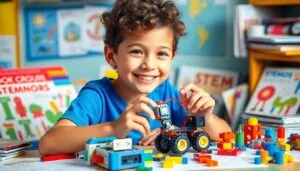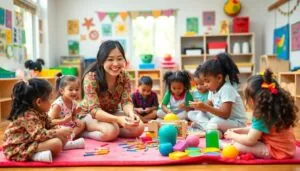In a world where emojis often replace words and social media interactions dominate, mastering social skills is more crucial than ever. Whether it’s charming your way through a networking event or simply making small talk at the coffee shop, these skills can make or break connections. Imagine walking into a room full of people and feeling like the life of the party instead of a wallflower hiding behind a potted plant.
Table of Contents
ToggleOverview of Social Skills Learning
Social skills learning involves developing interpersonal abilities essential for effective communication. Key components include verbal and nonverbal communication, active listening, and empathy. Emotional awareness plays a significant role in understanding and responding to others’ feelings.
Practicing social skills occurs in various settings, including schools, workplaces, and community environments. Interaction with peers fosters relationship-building and improves confidence. Participating in group activities enhances collaboration, while networking events create opportunities for professional connections.
Classroom programs often emphasize role-playing and social scenarios to teach appropriate responses. Outside-of-school programs also focus on real-world experiences, allowing learners to apply skills in practical situations. Youth organizations and workshops offer additional resources for skill refinement.
Barriers such as social anxiety can hinder social skills development. Acknowledging these challenges, tailored support can help build resilience and encourage practice in challenging environments. Progress monitoring assesses improvements and guides behavioral adjustments.
Studies show that individuals with strong social skills experience greater success in both personal and professional relationships. Effective social skills make interactions more enjoyable, fostering deeper connections. Information on specific techniques can motivate learners to enhance their skills.
In the digital age, social skills learning remains crucial despite online interactions. Adapting skills for face-to-face communication ensures meaningful connections while navigating the complexities of modern technology.
Importance of Social Skills

Social skills play a crucial role in various aspects of life, influencing interpersonal interactions and overall well-being. Effective communication contributes to strong relationships, making social skills essential for personal and professional environments.
Personal Development
Personal development thrives on solid social skills. Individuals who master communication techniques experience enhanced self-esteem and emotional intelligence. Building connections with others fosters empathy and understanding. Growth occurs when one engages in diverse social interactions. Opportunities for practice arise in everyday situations, such as casual conversations or group activities. Developing these abilities leads to healthier relationships and improved conflict resolution. Frequent engagement in social settings promotes adaptability and resilience.
Professional Success
Professional success relies heavily on effective social skills. Employers often prioritize candidates with strong interpersonal abilities. Networking events and team collaborations highlight the need for competent communication. Building rapport among colleagues can lead to increased collaboration and productivity. Individuals with well-developed social skills tend to inspire trust and respect, enhancing workplace dynamics. Career advancement often correlates with the ability to connect with others and navigate social environments. Adapting social skills for various professional contexts proves essential for long-term success.
Methods of Social Skills Learning
Social skills development occurs through various methods, enhancing interpersonal communication and relationship-building. Both formal education and informal experiences play significant roles in this process.
Formal Education
Schools often incorporate structured programs focused on social skills training. Classroom activities, workshops, and specialized courses help students practice verbal and nonverbal communication. Teachers encourage participation through group discussions, role-playing exercises, and peer interactions. Programs may also include assessments to track progress, ensuring students build essential skills like active listening and empathy. These formal settings provide a foundation in social skills, equipping individuals with tools to navigate future social interactions successfully.
Informal Learning Experiences
Real-world settings offer valuable opportunities for social skills practice. Community events, sports teams, and clubs create informal environments that foster interaction. Engaging with peers in these contexts promotes spontaneous conversations and collaboration. Parents play a crucial role, encouraging social engagement through family gatherings or playdates. Observational learning also occurs; individuals can adapt behaviors by watching others. Informal experiences, thus, complement formal education and reinforce social skills, contributing to well-rounded development.
Challenges in Social Skills Learning
Learning social skills presents specific challenges that individuals encounter in various environments. Recognizing these obstacles aids in devising effective strategies.
Overcoming Anxiety
Anxiety often manifests during social interactions, making communication difficult. Many individuals experience a fear of judgment, leading to avoidance of social situations. Techniques like deep breathing, exposure therapy, and cognitive-behavioral strategies help individuals alleviate this anxiety. Each technique allows them to gradually face their fears while enhancing their confidence. Engaging in structured practice, such as role-playing, provides real-time feedback, further easing anxiety over time.
Cultural Differences
Cultural backgrounds significantly influence social skills and communication styles. Variations in nonverbal cues, etiquette, and conversational norms can create misunderstandings. Individuals may find it challenging to navigate these differences in diverse groups. Learning about various cultures through discussions and immersive experiences improves adaptability. Individuals who actively seek to understand and respect these differences build stronger connections. Emphasizing cultural awareness fosters inclusivity and enriches social interactions.
Strategies for Effective Learning
Learning social skills effectively involves engaging techniques that promote practice and understanding. Two prominent approaches include role-playing techniques and group activities.
Role-Playing Techniques
Role-playing techniques simulate real-life scenarios to enhance social interactions. Participants assume different roles and engage in dialogues, allowing them to practice verbal and nonverbal communication. These exercises build confidence in navigating social situations, as they facilitate instant feedback from peers or instructors. Scenarios can range from job interviews to casual conversations, creating diverse learning experiences. Furthermore, individuals often learn to manage anxiety and adapt to varying social cues, boosting overall comfort in authentic interactions.
Group Activities
Group activities foster collaboration and provide ample opportunities for social skills practice. These settings encourage participants to work together on tasks or projects, promoting teamwork and communication. Engaging in discussions during group projects can enhance listening skills and empathy, essential components of effective interaction. Participants often gain insights into diverse perspectives, enriching their understanding of social dynamics. Additionally, group activities help individuals develop problem-solving skills, as they learn to navigate disagreements and collaborate toward common goals.
Mastering social skills is essential for thriving in both personal and professional realms. As interactions increasingly shift to digital platforms, the ability to engage in face-to-face communication remains vital. Developing these skills not only fosters deeper connections but also enhances emotional intelligence and self-esteem.
Through structured programs and real-world experiences, individuals can overcome barriers like social anxiety and cultural differences. Techniques such as role-playing and group activities provide practical avenues for honing these skills. Embracing social skills learning equips individuals to navigate various social environments confidently, ultimately leading to more fulfilling relationships and greater success in life.


